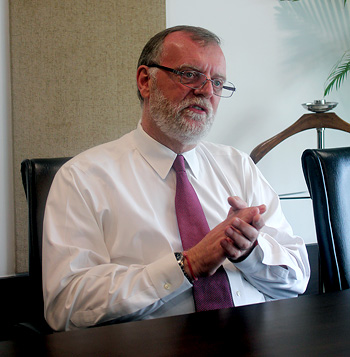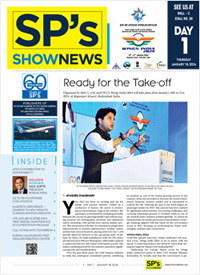- Prime Minister Narendra Modi inaugurates Aero India 2023 in Bengaluru; Releases Commemorative Stamp
- Defence Secretary meets delegations from Saudi Arabia, USA and Oman on the sidelines of Aero India 2023
- Foreign Ministers of 32 countries to attend Aero India 2023
- Embraer showcases the C-390 Millennium at Aero India 2023
‘Lockheed Martin to continue addressing Indian military requirements’
US-based Lockheed Martin has been ranked as the world’s number one defence company in terms of revenues, range of high technology products and solutions and for its substantial worldwide presence. It has been able to expand its global footprint as it believes in addressing the needs of militaries, transcending political affiliations. In India, it bagged its first major military contract in 40 years with the C-130J Super Hercules programme and is consolidating on that. In an interview with SP’s ShowNews, the Chief Executive of Lockheed Martin India, Phil Shaw, reiterates the company’s strategy of ‘supporting the Indian military’.

SP’s ShowNews (SP’s): Will change of government in India after the upcoming general elections here impact India-US relations?
Phil Shaw (Phil): I do not think so. Indo-US relations are expanding and as far as Lockheed Martin is concerned, the company has no political affiliations but is here to support the Indian military. Over years, India-US relations have strengthened and we want to build upon that relationship. With the Indian Defence Acquisition Council approving the second tranche of C-130J Super Hercules, it demonstrates the confidence that the Indian military has in the platform and we are excited of the possibilities here.
The US Deputy Secretary for Defence, Ashton Carter, during his recent visit to India, has stated in unambiguous terms that the US offers co-development and co-production partnerships for various defence programmes. That includes the Javelin Anti-Tank Guided Missile (ATGM) and the MH-60 Romeo helicopter. Lockheed Martin along with Raytheon is offering the Javelin missile.
There are ongoing discussions between the governments and any engagement is positive. The offer made by Ashton Carter is unprecedented. The Defence Trade and Technology Initiative which lists a number of items for technology transfer demonstrates the keenness of the United States in strengthening relations with India.
SP’s: Besides the C-130J programme, what is high on the agenda for Lockheed Martin in India?
Phil: Lockheed Martin is focused on three programmes right now - the C-130J; the maritime helicopter offering and the Javelin missile. The MH-60R ‘Romeo’ manufactured by Sikorsky Aircraft Corp and equipped with advanced mission systems and sensors by Lockheed Martin is the most capable and mature anti-submarine/anti-surface warfare helicopter. It packs a lot of punch. We have transferred technology and know-how of similar capabilities before in the United Kingdom, for the Royal Navy Merlin helicopter programme and would love to do something similar in India with a partner to develop an indigenous systems integrating capability. We are talking to both public and private sector companies. The partnership with Tatas was established in record time and the joint venture last year delivered the C-130J Empennage. We continue this dialogue with private and public companies at Defexpo.
SP’s: What is the update on the C-130J offering to the India Meteorological Department?
Phil: The discussions are continuing. The C-130J platform has multi-mission capabilities - maritime patrol, anti-submarine support, humanitarian relief as evidenced during the Uttarakhand relief operations, ability to land in high altitudes, etc. As the programme already exists here, it becomes more economical for other agencies to operate.
SP’s: In the market for unmanned aerial vehicles (UAVs), the Israelis have taken a lead in India and are still aggressive. What is the market like and what kind of competitive edge do you offer?
Phil: We are looking at the Indian UAV market and we have multiple product offerings - airships, hand-held UAVs, small unmanned aircraft systems, unmanned cargo-lifting as the K-Max helicopter, etc. With recent acquisitions of CDL Systems, Chandler/May and Procerus Technologies, the offering from Lockheed Martin has expanded considerably. We are aware of the Indian requirement and we will offer our capabilities accordingly.
SP’s: What are the systems Lockheed Martin produces for the US Homeland Security and are you planning to offer them to India?
Phil: Lockheed Martin has a vast portfolio of products and solutions. We have a huge number of sensors, radars, platforms, etc, which address the needs of homeland security. As a company with a wealth of experience in the defence as well as civil sectors, we are uniquely placed to perform and have considerable experience in homeland security and we have integrated such systems in 22 countries. We work with the customer and provide the ‘glue’ or systems integration skills to select and integrate complex solutions.. Lockheed Martin is in discussions with Indian companies to provide homeland security capabilities here.
SP’s: Other than the joint venture JV with the Tatas, is any other JV in the pipeline?
Phil: We already have a partnership with Fly Wings Aviation, Mumbai, called Flight Simulator Techniques Centre (FSTC) which is based here in Gurgaon. This facility has been providing simulator training for pilots of Boeing 737 NG and Airbus 320 aircraft. Considering the growing number of aircraft here, the demand for training is high and we are also looking at different aircraft types for simulator training. We are not just looking at the airlines in India, but also in the region.
SP’s: How much does India account for Lockheed Martin’s revenues?
Phil: I am not in a position to answer that, but the numbers are growing. We hope to see our footprint expand here.
SP’s: Is the present foreign direct investment (FDI) norm conducive for transfer of technology?
Phil: In the joint venture with Tatas we have 26 per cent equity and the programme is doing well. For higher technologies which need to be transferred we hope the FDI norms will be relaxed and we are aware that the government of India has announced that it would be looked at on a case to case basis. A relaxation to the FDI cap would provide more incentive to companies with a lot of IPR invested into the higher technologies.
SP’s: What is your focus at Defexpo 2014?
Phil: While we will be showcasing some of our programmes that fit Indian requirement, the focus certainly is going to be on the C-130J programme; Javelin missile (along with Raytheon) and maritime helicopter capabilities.





